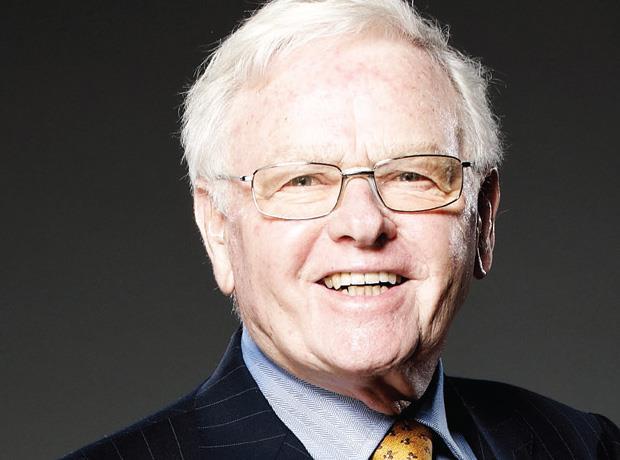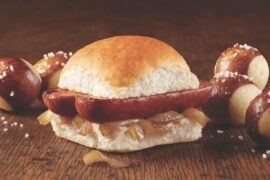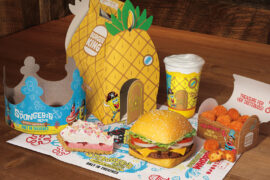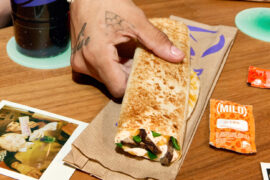FrozenFoodBiz.com is saddened to report that Francis Robert Brake died on December 22, 2018, which happened to be his 85th birthday, at Pilgrims Hospice in Kent, England. The longtime resident of Kenningston, Ashford, had been suffering with respiratory illness for four years, which worsened in November.
The highly successful businessman, entrepreneur and philanthropist was best known as one of the three brothers who founded Brake Bros, the dominant supplier of frozen and non-frozen food products to the United Kingdom foodservice industry and a leading distributor of frozen and chilled food in France. He was also the former president of the British Frozen Food Federation and the Ashford Rotary Club.
“He had a lovely birthday in the hospice, with lots of friends and family, but sadly he passed away that day,” said daughter Michelle Leveridge. “He was a very strong family man, involved in all the local affairs, and was a wonderful father. We’re very proud of his achievements.”
Frank Brake was born during 1933 in Holborn, London. The son of New Oxford Street publicans was the middle of the first three Brake brothers that included William and Peter, who jointly founded the company. A fourth sibling, Paul, was born after the end of World War II.
The lives of the elder brothers were disrupted by the outbreak of hostilities in 1939, requiring them to be evacuated from London and separated from their parents for the majority of the war. Out of necessity, they became strongly independent and self-reliant.
The boys attended various wartime schools in Worthing, Ealing and Banbury prior to entering the Licensed Victuallers (LV) School in Slough, which has relocated to Ascot. The three Brake brothers expressed gratitude for their LV education by the building of a sixth form center.
After leaving school Frank enrolled in a course in Hotel and Catering Management at Borough Polytechnic – now South Bank University. In recognition of subsequent business achievements he was awarded an Honorary Fellowship by the London university in 2012, and his Frank Brake scholarship program has sponsored many deserving students.
In 1952 Frank served his compulsory national service in the RAF, initially as a trainee pilot, then being posted to London and later Cardington in Bedfordshire. In 1954 he subsequently resumed hotel management training, working in all roles at properties in Morecombe (the Grand Hotel) and London (the Park Lane Hotel).
While learning to be independent, he found that even the worst experience is valuable and that it is for one’s own benefit to be exposed to hardship.
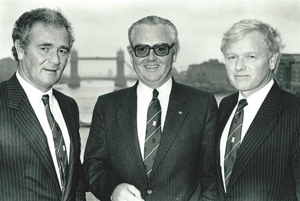 Frank Brake (right) is seen with fellow Brake Bros founders Peter and William during the early period of building what would become Britain’s largest wholesale food supplier.William, the senior brother, was by now running a pub in Swindon. On the advice of a local farmer he was also buying, processing and selling chickens. Frank was asked to help out during one busy Christmas season. He saw an opportunity to increase production and he never returned to the hotel business. Working all hours, it was hands on, unpleasant work. Eventually joined by younger brother Peter, they moved to Kent to expand the business.
Frank Brake (right) is seen with fellow Brake Bros founders Peter and William during the early period of building what would become Britain’s largest wholesale food supplier.William, the senior brother, was by now running a pub in Swindon. On the advice of a local farmer he was also buying, processing and selling chickens. Frank was asked to help out during one busy Christmas season. He saw an opportunity to increase production and he never returned to the hotel business. Working all hours, it was hands on, unpleasant work. Eventually joined by younger brother Peter, they moved to Kent to expand the business.
After experiencing some lean times and engaging in extremely hard work, their poultry packing venture began to grow and the first fledgling Brake Bros enterprise, known as Poultry Packers, was registered in 1958, supplying chickens to pubs, restaurants and hotels. The Ashford-based company also started to sell freezers and frozen foods. In 1972 a decision was made to stop chicken processing and concentrate fully on supplying a much more extensive range of frozen foods.
Brake Bros, which today operates as the Brakes Group, is widely acknowledged for changing the food landscape in British pubs and restaurants.
![]()
“Developing Brakes from those early days was no mean feat and meant constantly innovating and identifying opportunities. For example, being the pioneers in frozen food and one of the early innovators in foodservice ready meals, creating meals that could compete with freshly prepared foods,” said Hugo Mahoney, chief executive officer of Brakes UK. “The brothers were not afraid to move on either, as they ceased poultry production when it became apparent that there were better opportunities elsewhere.”
On Business Success
Frank believed early on that the key to commercial success was a combination of attention to detail, maintaining top quality standards, and retaining operational control. Innovative products, rapid expansion and a strong focus on high quality, efficient procedures and advanced IT systems ensured that Brake Bros grew rapidly in Britain and expanded abroad. It became the leading distributor of foods in the UK, with a sophisticated network of rapid distribution centers and an enviable reputation for reliability.
From a customer’s perspective, this attention to detail was nowhere more apparent than in Brake’s highly efficient delivery system.
“We set up a tremendous service which other firms couldn’t and hadn’t ever done before,” Frank explained. “We’d take orders until 4:30 PM for delivery the next day. We had excellent systems that allowed us to process the order and have it ready to go out at 5 AM, often delivering to customers as early as 7 AM. We were able to fulfill 99.9% of orders this way.”
Focus on Quality
The company prospered in large part because of its sharp focus on quality.
“In the food industry, the quality and safety of the product is paramount,” said Frank. “So we invested a lot of time and money to ensure that the product the customer received was the very best. Our name was on the box, so it was not only the company’s reputation, but also our personal pride at stake.”
Dedicating to providing top quality food fare was backed by hard work.
“When we started we needed to get some capital into the business,” Frank recalled. “My brothers and I did two men’s work and took half a man’s pay. We had a very strong determination to succeed. When people ask what motivated us in those early years, I always say it was the pressure to pay last month’s bills!”
A highly successful public flotation of stock was launched in 1986, permitting further expansion, acquisitions and success. Peter unfortunately died unexpectedly in 1989, and as William’s health declined Frank assumed the responsibility of taking the helm as managing director. When he retired as chairman and sold the company at age 68 in 2002, it was the No. 1 food supplier to the foodservice industry in the UK, and also a leading national distributor of frozen and chilled food in France, with a turnover of approximately £1.5 billion and over 9,250 employees on the payroll.
The sale to Clayton, Dubilier & Rice, an American private equity firm, netted Brake family members over £252 million. The buyer paid 825p a share, or £434 million, and assumed £178 million of debt. The Brake family owned 58% of the company when the deal was sealed.
“I don’t tend to look back and gloat but, today is a moment of realization and it’s not bad what we’ve done,” said Frank at the time.
In 2007 the company was bought by Bain Capital, and in 2016 it was acquired by Houston, Texas-headquartered Sysco Corporation in a £2.2 billion ($3.1 billion) deal. By then the much expanded Brakes Group was delivering more than 1.5 million boxes of food to over 200,000 customer sites in the UK, Ireland, France, Sweden, Spain, Belgium and Luxembourg on a daily basis. Selling over 50 million frozen fish fingers and a wide assortment of other products per year, it then ranked and continues to rank as the largest wholesale food supplier in Britain.
Personal Life
In his personal life, Frank made significant contribution to charities, both through generous donations, via his charitable trust, and with personal project involvement. Major involvements included project leadership and matched funding for the building of the Kent Multiple Sclerosis therapy Center, significant contributions to Parkinson’s UK and Cure Parkinson’s, Ashford Pilgrim’s Hospice, and many smaller local charities in Kent, where Frank lived for well over 50 years, and was well known and deeply involved in local community life.
He also spent much of his time in London, a city he loved, both in his working and personal life, attending conferences, talks, galleries, concerts and dinners.
A lifelong Arsenal Football Club supporter, Frank was always a passionate sports fan. He was enthusiastic about rowing, cricket and soccer, and continued to play golf and tennis regularly well into his senior years. Frank married his wife Evelyn in 1959 and has three children: Michelle, Phillip and Richard. He placed great emphasis on family strength, creating and supporting initiatives for young people to work hard, better themselves and to create and take opportunities in their lives – values that he always encouraged in his grandchildren and beyond.

